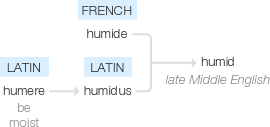Humid
late Middle English: from French humide or Latin humidus, from humere ‘be moist’.
wiktionary
Borrowed from Old French humide, from Latin humidus, umidus(“moist”). Via Proto-Indo-European *wegʷ-(“wet”) related to English weaky.
etymonline
humid (adj.)
"moist or accompanied with moisture; containing, or formed or effected by, water or vapor; wet, damp," early 15c., from Old French humide, umide "damp, wet" (15c.) or directly from Latin humidus "moist, wet," variant (probably by influence of humus "earth") of umidus, from umere "be moist, be wet," from Proto-Italic *umo- "wet" (also source of Latin umidus "wet, moist," umiditas "moisture," umor "moisture, fluid," umectus "moist, wet"), perhaps from PIE *uhrmo- "wet," from the same source as Latin urina [de Vaan].
